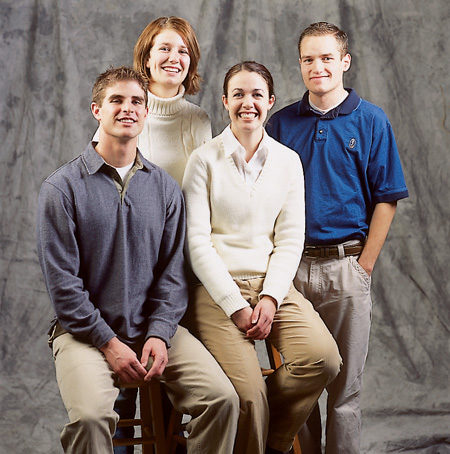Since 1991 BYU Replenishment Grants have helped more than 2,000 students get through school, and now those graduates are giving back, providing funds for a whole new generation of BYU students.
Christopher A. Bergaust (BA ’04), a U.S. Foreign Service Officer in Casablanca, Morocco, says his experiences at BYU—the education he received, the friends he made, and the girl he married—helped get him where he is today, and receiving a Replenishment Grant was an important part of that equation.
“I graduated debt-free from college, which was very helpful in starting my professional career,” he says. “Many of my friends graduated with tens of thousands of dollars in student loans, and I saw just how difficult it was for them to make their monthly payments. Some took jobs they didn’t really want because they had to repay what they had borrowed.”
Bergaust has since repaid his Replenishment Grant, plus an additional 10 percent as his way of saying thanks. “I plan on continuing to give so that others can have similar opportunities,” he says.
Alumni regional chapters and the BYU Alumni Association combine to give 200 to 250 full- or half-tuition Replenishment Grants each year to students like Bergaust—undergraduates who excel academically (at least a 3.0 GPA) and stand in need of financial assistance. Like the Perpetual Emigration Fund in the 1850s and the Perpetual Education Fund established in 2001, the Replenishment Grant program not only provides financial aid, but also places on recipients a moral obligation to assist those who follow after.
“The whole idea behind the grants is that students learn to give,” says Roy A. Brinkerhoff (MFA ’84), who oversees the Replenishment Grant program at the BYU Alumni Association. “We just hope that the principle of replenishment can be instilled in everyone’s lives.”
While the Alumni Association asks recipients to repay the grants, there is no formal effort to collect the money and the program does not establish a schedule for repayment. In this way, the grants act as zero-interest loans that don’t carry the pressure and anxiety of other types of student debt.
“It wasn’t something that weighed on my mind while I was a poor college student,” says Seretta G. Hart (BM ’03), who is now studying for her doctorate at the University of Utah after working as a band director at Springville High School and at BYU. “As soon as I was able to, though, I was more than happy to pay it back because of the generosity that I was shown.”
Replenishment Grants also connect different generations of BYU students. “It puts giving into a real perspective,” says Hart. “Because of how I felt when I needed the help, I understand that there are people now who need the same kind of help and will feel just as grateful for that help as I did.”
Rachelle Herbst Christensen (BS ’97) and her husband still donate to the Replenishment Grant Fund annually because of the help it provided her. “I was able to receive [a Replenishment Grant] at a time when I really needed it financially,” she says, “so it wasn’t too much to ask that I pay it back so others can have that same blessing.”









